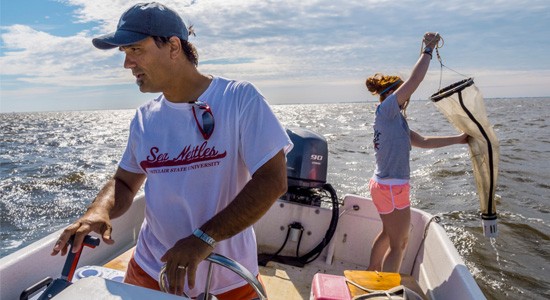The potentially life-threatening stings associated with certain species of jellyfish have not stopped Dr. Paul Bologna from working closely with these predatory marine animals in order to learn more about how they operate, protect the environment and keep swimmers safe from their dangerous tentacles during the warm weather.
Bologna has spent the last few years studying the sea nettle, a species of jellyfish that has recently experienced massive population growth in the Barnegat Bay, a body of water located in Ocean County, N.J.
Bologna and his colleague, Jack Gaynor, were funded by the New Jersey Department of Environmental Protection to research the impact of jellyfish on the aquatic food web. Over the summer, Bologna had a team of student researchers help to cover more ground from which they gained valuable experience from hands-on research.
Associate Professor of Biology and the Director of the Marine Biology and Coastal Sciences Program at Montclair State University, Bologna has been working in environmental restoration for well over a decade. He has been conducting research on the submerging aquatic vegetation for the past 13 years in both New Jersey and the Caribbean and has succeeded in advancing understanding of eelgrass population genetics, effectively restoring seagrass and much more.
According to his profile on Montclair State’s website, his research on seagrass restoration earned him the Environmental Excellence Award from the New Jersey Department of Environmental Protection in 2002. He is also the current President of the New Jersey Academy of Sciences.
In an interview Bologna gave for a Q&A, he shared some insight on his most recent research. The sea nettles have prospered enormously in the bay over the past few years and there are a few key reasons for this. They eat the same food as other inhabitants of the bay and they require less oxygen to survive which gives them strength over other organisms.
This combination of traits has allowed them to become the top predators of this body of water and while sea nettles are problematic and can have serious repercussions on the aquatic environment, Bologna has respect for them and reminds people that the nettles are an important species of the aquatic ecosystem.
Sea nettles are not the only type of jellyfish he has studied. Bologna has also done research on larger, more dangerous jellyfish. One significant type is the Portuguese Man-of-War, a species of jellyfish which can grow tentacles up to 100 feet long and has been migrating farther and farther up the east coast since the spring of 2015. This jellyfish was initially seen along the Atlantic Ocean on Florida’s coasts and had been moving further north along the coast as the summer went on.
When the species reached the Jersey Shore, Bologna and his team had the opportunity to study them closely in different coastal areas of the state. According to Bologna, “their sting can bring on Irukandji syndrome, which can cause cardiac arrest and respiratory failure,” making them extremely hazardous creatures to get too close to.
Even with the risks of his hands-on research, Bologna has shown his continued passion for impacting environmental research and is giving students access to his knowledge and expertise through his team of student researchers.





